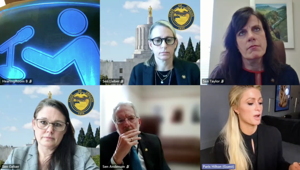‘We call this kidnapping’: Oregon bill on child restraint laws sees support from Paris Hilton

(The Center Square) – A bill in the Oregon Legislature this session would further restrict when and where someone can restrain institutionalized children, a topic all too personal for reality television star Paris Hilton.
Hilton, celebrity heiress to the Hilton hotel fortune, testified on Senate Bill 710 to the state’s Senate Human Services Committee on Thursday afternoon, sharing her experience of being forcibly transported to a child behavioral facility, Provo Canyon School, in Utah.
Hilton recalled how at the age of 16 she was woke up in the middle of the night by two men with handcuffs who asked her whether she wanted to come with them “the easy way” or “the hard way.” Dragged out of bed without the slightest hint of where she was going, Hilton said, she assumed she was being taken hostage.
“They knew who I was and they were on a schedule,” Hilton said. “My parents stood by and watched this happen because they were told this was the only way to do it. In any other context, we call this kidnapping.”
Youth transport agencies like the one hired to snatch Hilton in the night are part of a burgeoning industry ferrying children to such facilities. As research by American University shows, the “hard way” for most children comes in the form handcuffs and force.
In 2016, there were 45,567 youth placed in 1,772 behavioral facilities nationwide, according to a U.S. Justice Department report. In Oregon, the once popular Sequel Youth and Family Services facility which operated from 2016 to 2018 faces potential child abuse investigations by U.S. Rep. Suzanne Bonamici, D-Oregon.
Hilton told the committee that physical restraints like the ones she experienced are too often used as a means of punishment rather than as a way of protecting children from themselves and add to their trauma, Hilton said.
“I challenge you, is this process necessary, therapeutic, or in any sense, the way to do it?” Hilton said. “No child should suffer from nightmares in their adult years because of how they were forcibly removed from their home.”
Since last fall, Hilton has promoted nationwide efforts to revise state laws on child transportation, including a similar bill which passed the Utah Legislature earlier this year.
Sponsored by state Sens. Sara Gelser, D-Corvallis, and James Manning Jr., D-Eugene, the Oregon bill would bring all of the state’s current laws concerning child restraints “into a single place,” as Gelser describes it, to lay out the rules more clearly to youth, advocates, and regulators.
SB 710 divides the state’s list of potential child restraints into three sections.
First are what the bill would designates as impermissible “red light” actions such as chemical, mechanical, and neck restraints, all of which are illegal in Oregon, as are restricting a child’s breathing or putting pressure on their intimate parts.
The three “green light” actions the bill would designate as “always permitted” are holding a child’s arm or hand while escorting them, assisting them to complete a task, and using “minimal force” to break up a fight as long as it does not equal a “red light” action.
“Yellow light” actions under the bill would apply to any type of restraint used by a trained person under imminent risk of harm so long as it does not qualify as a “red light” action.
The bill would have child care facilities produce written reports on every five minutes after the first 10 minutes a restraint or instance of solitary confinement is used and maintain bathroom and water access every 30 minutes. They could also not house youth for more than 60 straight days if also housing juveniles in state custody.
Child care facilities would also have to produce quarterly reports to the state Department of Human Services which would be made public online. Parents and guardians would be notified of such reports when a child enters care.
Hilton was joined in her support of SB 710 by several other survivors of child care facilities. They included Chelsea Filer, who at the age of 15 was dragged to a facility where she received permanent back injuries, and Lindsay Spyker, who at 16 was taken to Utah’s Cross Creek Manor where she spent four years in and out of solitary confinement.
“I hope no other child has to go through what I did,” Spyker said. “That they don’t have to be kidnapped in the middle of the night and taken to a ‘school’ out of state that is unregulated and abusive. This has to stop.”
Critics of the bill, including parents and child care specialists who submitted testimony on Thursday, supported much of its intent, but shared concerns that its reporting mandates would be too costly for facilities. Others worried SB 710’s definitions of restraints and childcare facilities were too broad.
Currently, SB 710 is not scheduled for any further hearings in the Senate where Democrats are looking to conduct business free of more walkout protests.
Disclaimer: This content is distributed by The Center Square


